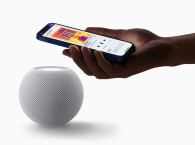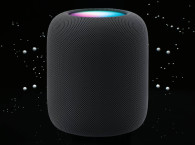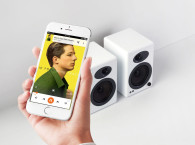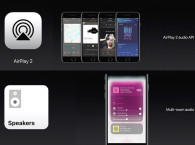
Small in size, but actually enormous in its market significance and technology implications. For those who didn't notice, during the event supposed to be focused on the iPhone 12 unveiling, this week Apple also announced its new HomePod mini, which the company actually called... a smart speaker. This is like a reset from Apple in this category. It costs just $99 and combines music listening, interactions with a digital voice assistant (Siri, of course), and smart home capabilities, in a beautiful compact design with a focus on privacy and security. I'm not going to dive into the details, since we have done that in our post that same day.
My first thought immediately went toward the impact that this announcement will have on all speaker manufacturers currently in business. As we all know, the volumes of smart speakers sold by Amazon and Google alone, is massive. And regardless of its business, the smart speaker competition mainly affected the sales in some very specific product categories, like those of the more affordable wireless audio home speakers. It didn't affect (yet) the portable (battery-operated) Bluetooth speaker market, which continues to ship millions of units, as it didn't really affect the hi-fi or high end audio brands. Apple entering the space, will serve to show how this might start impacting home audio overall - in my opinion, expanding the addressable market even more.
From my notes while I was watching that opening moment dedicated to the HomePod mini, my attention was immediately drawn to the fact that Apple highlighted its actual speaker design characteristics. Apple is once again committed to differentiate on quality - and in this case, relative audio quality, coming from a tiny device.
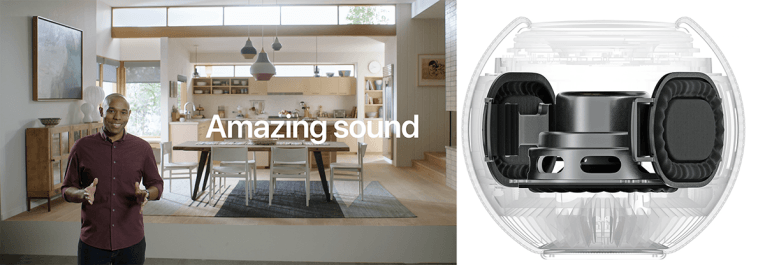
Apple's audio development team is seriously committed to pushing the envelope, and showing the differences compared to existing rival designs (particularly, in this category, Amazon's market leading Echo smart speakers). And after listening to the original Apple HomePod, and realizing how good it sounds and how sophisticated the complete system (including sensors and software) is, my expectations are certainly raised. I was not expecting Apple to brag about the qualities of a "small" speaker, when they previously launched the HomePod. And yet, that's what they have done, certainly feeling reassured by the might of the company's industrial design and manufacturing resources.
Although it will be promoted as Apple's "actual" first smart speaker to compete directly with Amazon and Google (and all the Chinese references in the category), the HomePod mini Smart Speaker will attempt to "sound better" by leveraging a single full range driver, matched with passive radiators and an acoustic waveguide, similar to that one of the original HomePod, just smaller. And to make sure that the maximum potential of that driver arrangement is extracted, Apple relies again on its own silicon - the S5 chip.
The S5 system-on-module - is completely focused on what the company calls "Computational Audio." The goal, apart from optimizing the speaker's response, is to combine clever signal analysis and processing, plus acoustics compensation. As we've discussed multiple times in audioXpress articles, showing the full potential of combining sensors and DSP to fully optimize the audio experience, regardless of the physical limitations and material compromises.
The new Apple S5 chip also reinforces the device's edge AI capabilities to improve voice processing, reinforcing the privacy and security argument of the HomePod Mini. The S5 also enables the HomePod mini to deliver on many other fronts, starting with its ability to quickly integrate all radio modules, WiFi, and Ultra Wideband (UWB) technology (Apple is incorporating UWB in all its products), allowing for very fast pairing abilities with other devices, automatic configuration of stereo pairs when another HomePod mini is detected, sync multiroom reproduction across the whole house, and more. New features made possible by this design are completely unique, and include the ability for the speaker to detect the presence of a user's iPhone nearby (via UWB) and reflect its personal preferences and settings. That same ability to sense devices and operate in a complete wireless networked ecosystem, enables the innovative new family Intercom feature, which is one of the HomePod mini's best selling arguments. (Watch the video to understand.)
We'll have to wait to be able to judge other aspects, such as the supposedly much-improved Siri. I'll just add that a voice assistant on a smart speaker has some clear advantages over the same use on a smartphone or computer, given that it is a system optimized for far-field voice detection and recognition. But more importantly, this will offer a chance to finally compare the "Siri keeps getting better" with Alexa and Google Assistant. What we learned for now is that Apple is catching up with Alexa in its ability to recognize individual users, while going much farther with its ecosystem approach and the UWB scanning of devices, to interact with multiple users at the same time. This integration is also what enables the potential for a user to leave home and get into a CarPlay-equipped vehicle enjoying a seamless music listening and assistant experience. (Ask for the opening time of a restaurant at home, and you will see the map showing the way when you get in the car.) All very interesting features that we are certain will continue to expand, like Apple already demonstrated with the recent AirPods firmware upgrades.
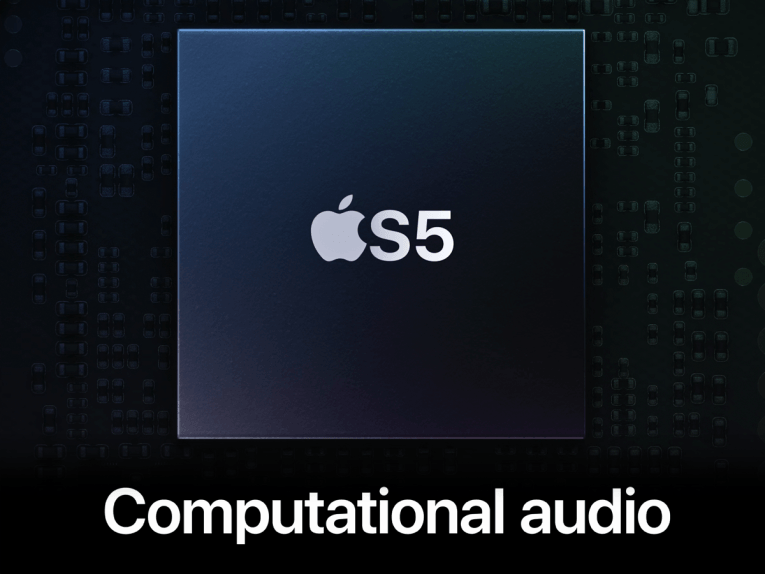
I'll leave here some additional comments about Apple's announcements from Futuresource Consulting's analyst team, which always have an interesting market-intelligence perspective.
"The reasonable price points of the iPhone 12 and the iPhone 12 Mini will certainly not prove prohibitive to the majority of Apple consumers, and when considered alongside the SE released earlier this year, it's clear that Apple is targeting growth in its active installed base to help facilitate further expansion of its increasingly important services," writes Stephen Mears from Futuresource. I think the same can be said of the $99 price level of the HomePod mini.
"The dominance of Amazon and Google has led many to see the smart speaker market as a two-horse race, but the new HomePod Mini from Apple shows that the Cupertino giant is far from conceding defeat," commented Alexandre Jornod (Futuresource). "At a $99 price point, Apple aims to make its smart speaker more appealing to the mass market but also to promote multiple ownerships with multi-room, smart home, and seamless stereo pairing. This is also to reinforce its eco-system of product and services in the home," he adds.
"Apple has had huge success in the headphones market over the last couple of years, leading the True Wireless Earbuds market with its dominant AirPods product line. The move by Apple to remove the free headphones bundled in the box, combined with a lack of lightning connector products in the market, will undoubtably force more consumers to enter the wireless earbuds market, with Apple being in prime position to capitalize," comments Luke Pearce (Futuresource).
Well, I would add here that many audio manufacturers should start looking at similar ways to leverage the smart speaker ecosystem, from Apple and Amazon - at least. There is a world of profitable opportunities for audio products that could complement smart speakers, instead of trying to compete head to head.
This article was originally published in The Audio Voice newsletter, October 15 2020 (#299). Click here to register to The Audio Voice




